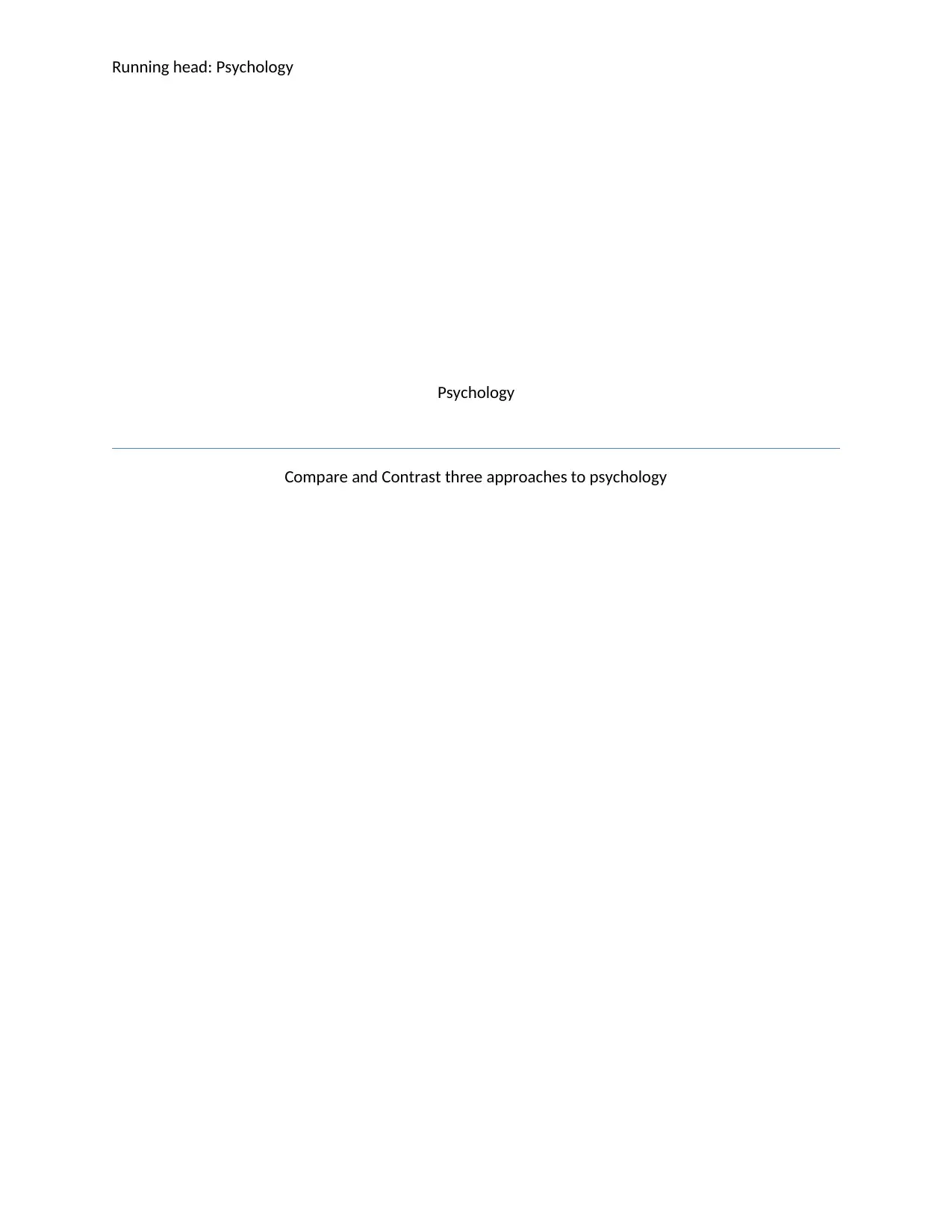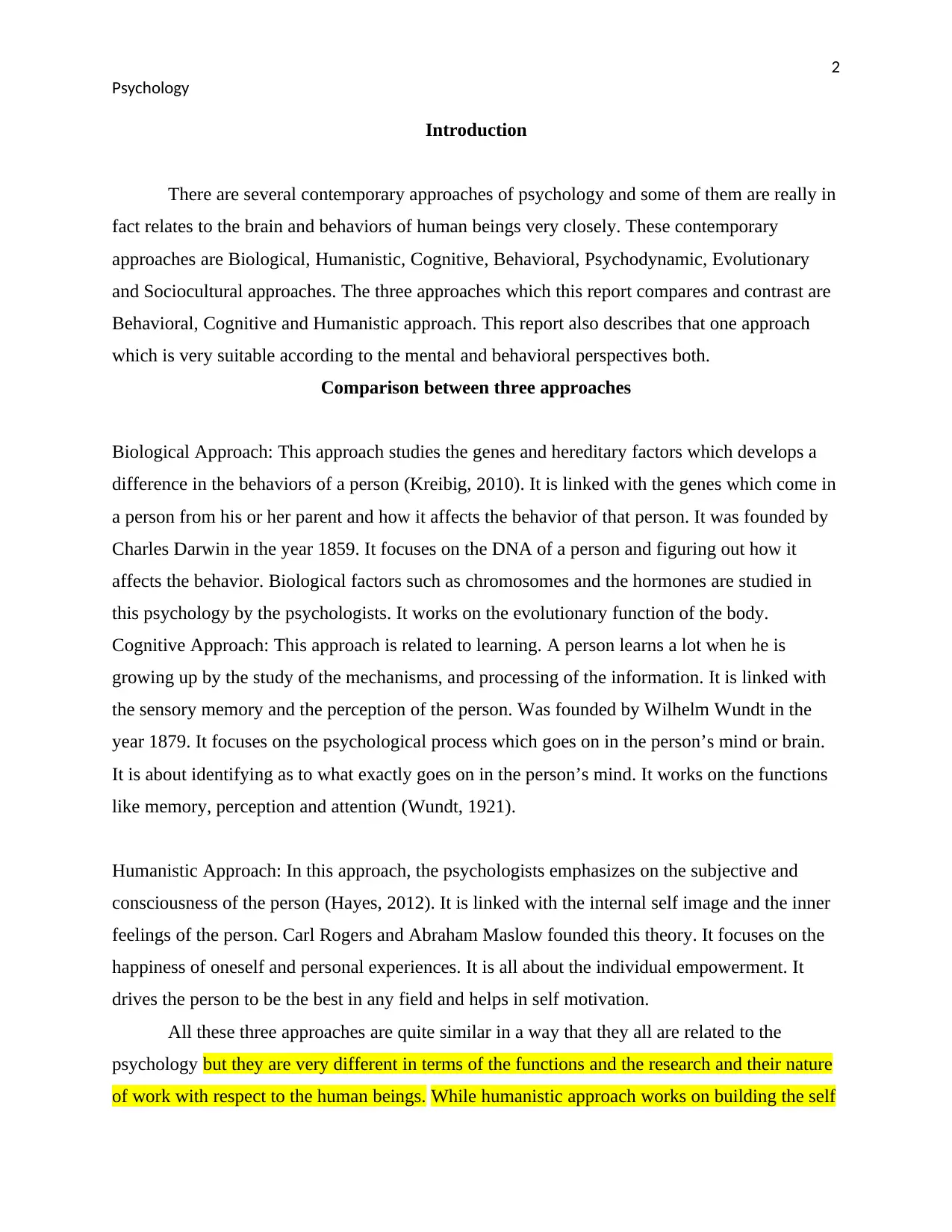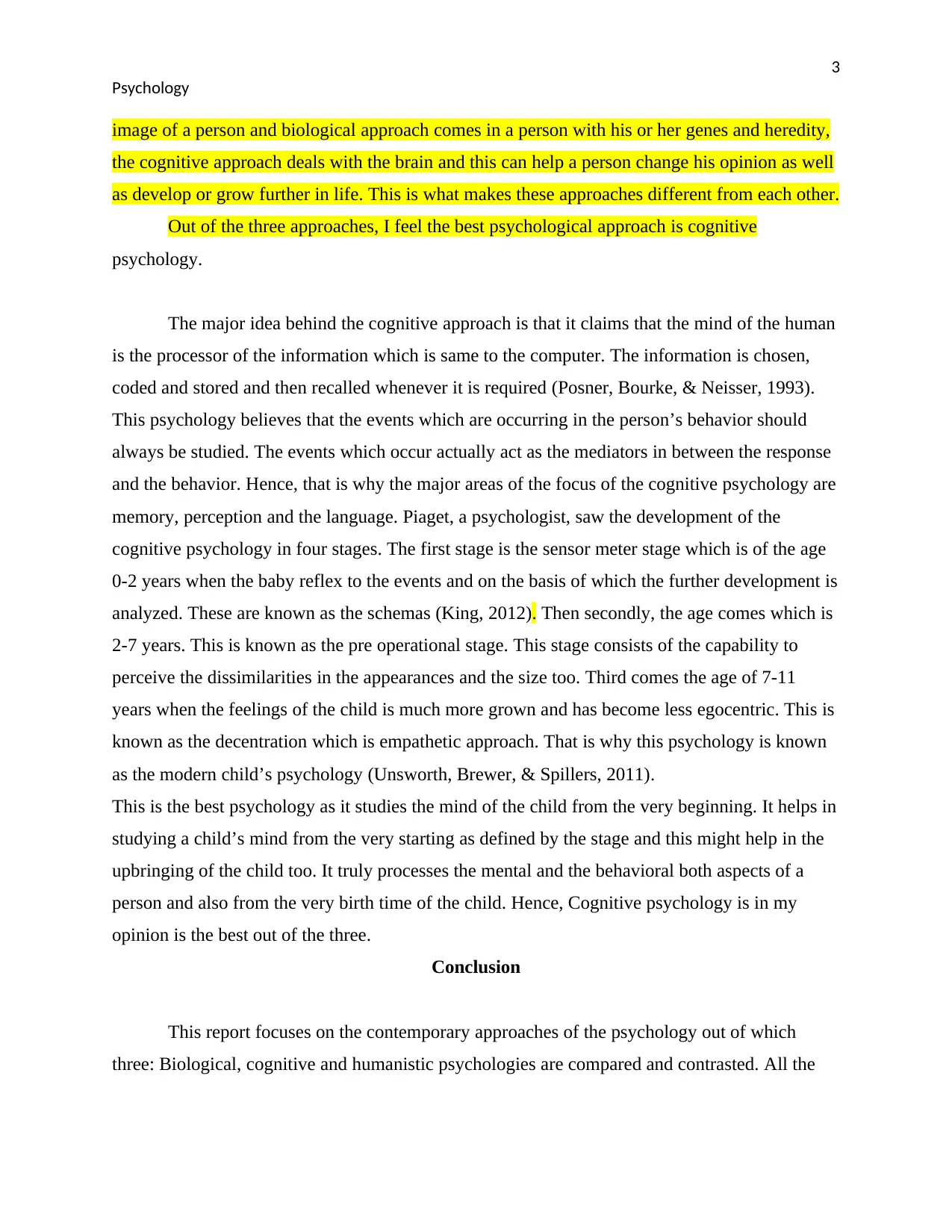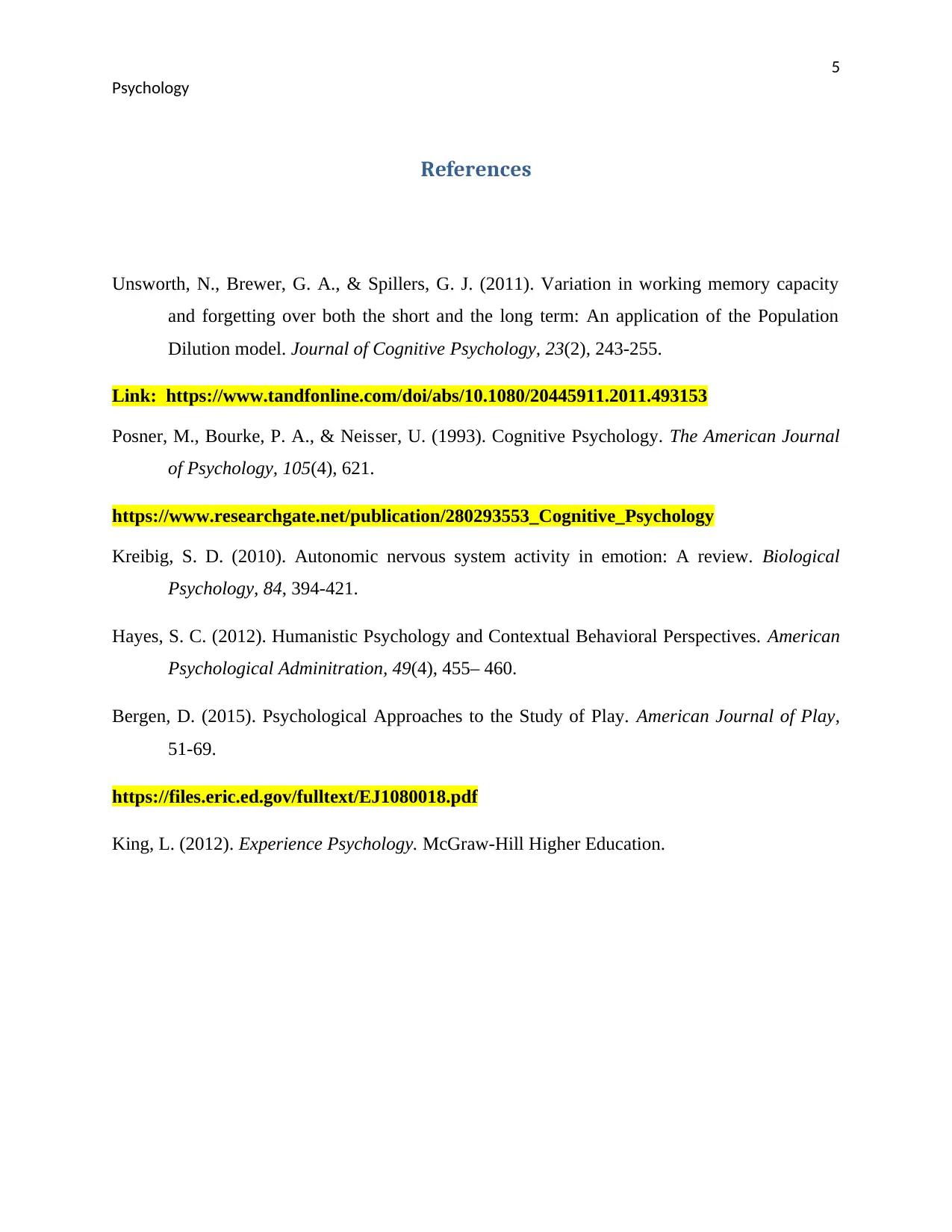Psychology Approaches: Comparing Behavioral, Cognitive, Humanistic
VerifiedAdded on 2023/06/10
|5
|1140
|356
Report
AI Summary
This report fulfills a PSY 111 assignment requirement to compare and contrast three contemporary approaches to psychology: behavioral, cognitive, and humanistic. The report begins with an introduction to various psychological approaches, then delves into a detailed comparison and contrast of the selected three, highlighting their core principles, historical backgrounds, and areas of focus. The author discusses the biological, cognitive, and humanistic approaches. The cognitive approach is identified as the most suitable for explaining behavior and mental processes. The report concludes with a justification for this choice, emphasizing the cognitive approach's emphasis on information processing and its stages. The references are included in APA style.

Running head: Psychology
Psychology
Compare and Contrast three approaches to psychology
Psychology
Compare and Contrast three approaches to psychology
Paraphrase This Document
Need a fresh take? Get an instant paraphrase of this document with our AI Paraphraser

Psychology
Introduction
There are several contemporary approaches of psychology and some of them are really in
fact relates to the brain and behaviors of human beings very closely. These contemporary
approaches are Biological, Humanistic, Cognitive, Behavioral, Psychodynamic, Evolutionary
and Sociocultural approaches. The three approaches which this report compares and contrast are
Behavioral, Cognitive and Humanistic approach. This report also describes that one approach
which is very suitable according to the mental and behavioral perspectives both.
Comparison between three approaches
Biological Approach: This approach studies the genes and hereditary factors which develops a
difference in the behaviors of a person (Kreibig, 2010). It is linked with the genes which come in
a person from his or her parent and how it affects the behavior of that person. It was founded by
Charles Darwin in the year 1859. It focuses on the DNA of a person and figuring out how it
affects the behavior. Biological factors such as chromosomes and the hormones are studied in
this psychology by the psychologists. It works on the evolutionary function of the body.
Cognitive Approach: This approach is related to learning. A person learns a lot when he is
growing up by the study of the mechanisms, and processing of the information. It is linked with
the sensory memory and the perception of the person. Was founded by Wilhelm Wundt in the
year 1879. It focuses on the psychological process which goes on in the person’s mind or brain.
It is about identifying as to what exactly goes on in the person’s mind. It works on the functions
like memory, perception and attention (Wundt, 1921).
Humanistic Approach: In this approach, the psychologists emphasizes on the subjective and
consciousness of the person (Hayes, 2012). It is linked with the internal self image and the inner
feelings of the person. Carl Rogers and Abraham Maslow founded this theory. It focuses on the
happiness of oneself and personal experiences. It is all about the individual empowerment. It
drives the person to be the best in any field and helps in self motivation.
All these three approaches are quite similar in a way that they all are related to the
psychology but they are very different in terms of the functions and the research and their nature
of work with respect to the human beings. While humanistic approach works on building the self
2
Introduction
There are several contemporary approaches of psychology and some of them are really in
fact relates to the brain and behaviors of human beings very closely. These contemporary
approaches are Biological, Humanistic, Cognitive, Behavioral, Psychodynamic, Evolutionary
and Sociocultural approaches. The three approaches which this report compares and contrast are
Behavioral, Cognitive and Humanistic approach. This report also describes that one approach
which is very suitable according to the mental and behavioral perspectives both.
Comparison between three approaches
Biological Approach: This approach studies the genes and hereditary factors which develops a
difference in the behaviors of a person (Kreibig, 2010). It is linked with the genes which come in
a person from his or her parent and how it affects the behavior of that person. It was founded by
Charles Darwin in the year 1859. It focuses on the DNA of a person and figuring out how it
affects the behavior. Biological factors such as chromosomes and the hormones are studied in
this psychology by the psychologists. It works on the evolutionary function of the body.
Cognitive Approach: This approach is related to learning. A person learns a lot when he is
growing up by the study of the mechanisms, and processing of the information. It is linked with
the sensory memory and the perception of the person. Was founded by Wilhelm Wundt in the
year 1879. It focuses on the psychological process which goes on in the person’s mind or brain.
It is about identifying as to what exactly goes on in the person’s mind. It works on the functions
like memory, perception and attention (Wundt, 1921).
Humanistic Approach: In this approach, the psychologists emphasizes on the subjective and
consciousness of the person (Hayes, 2012). It is linked with the internal self image and the inner
feelings of the person. Carl Rogers and Abraham Maslow founded this theory. It focuses on the
happiness of oneself and personal experiences. It is all about the individual empowerment. It
drives the person to be the best in any field and helps in self motivation.
All these three approaches are quite similar in a way that they all are related to the
psychology but they are very different in terms of the functions and the research and their nature
of work with respect to the human beings. While humanistic approach works on building the self
2

Psychology
image of a person and biological approach comes in a person with his or her genes and heredity,
the cognitive approach deals with the brain and this can help a person change his opinion as well
as develop or grow further in life. This is what makes these approaches different from each other.
Out of the three approaches, I feel the best psychological approach is cognitive
psychology.
The major idea behind the cognitive approach is that it claims that the mind of the human
is the processor of the information which is same to the computer. The information is chosen,
coded and stored and then recalled whenever it is required (Posner, Bourke, & Neisser, 1993).
This psychology believes that the events which are occurring in the person’s behavior should
always be studied. The events which occur actually act as the mediators in between the response
and the behavior. Hence, that is why the major areas of the focus of the cognitive psychology are
memory, perception and the language. Piaget, a psychologist, saw the development of the
cognitive psychology in four stages. The first stage is the sensor meter stage which is of the age
0-2 years when the baby reflex to the events and on the basis of which the further development is
analyzed. These are known as the schemas (King, 2012). Then secondly, the age comes which is
2-7 years. This is known as the pre operational stage. This stage consists of the capability to
perceive the dissimilarities in the appearances and the size too. Third comes the age of 7-11
years when the feelings of the child is much more grown and has become less egocentric. This is
known as the decentration which is empathetic approach. That is why this psychology is known
as the modern child’s psychology (Unsworth, Brewer, & Spillers, 2011).
This is the best psychology as it studies the mind of the child from the very beginning. It helps in
studying a child’s mind from the very starting as defined by the stage and this might help in the
upbringing of the child too. It truly processes the mental and the behavioral both aspects of a
person and also from the very birth time of the child. Hence, Cognitive psychology is in my
opinion is the best out of the three.
Conclusion
This report focuses on the contemporary approaches of the psychology out of which
three: Biological, cognitive and humanistic psychologies are compared and contrasted. All the
3
image of a person and biological approach comes in a person with his or her genes and heredity,
the cognitive approach deals with the brain and this can help a person change his opinion as well
as develop or grow further in life. This is what makes these approaches different from each other.
Out of the three approaches, I feel the best psychological approach is cognitive
psychology.
The major idea behind the cognitive approach is that it claims that the mind of the human
is the processor of the information which is same to the computer. The information is chosen,
coded and stored and then recalled whenever it is required (Posner, Bourke, & Neisser, 1993).
This psychology believes that the events which are occurring in the person’s behavior should
always be studied. The events which occur actually act as the mediators in between the response
and the behavior. Hence, that is why the major areas of the focus of the cognitive psychology are
memory, perception and the language. Piaget, a psychologist, saw the development of the
cognitive psychology in four stages. The first stage is the sensor meter stage which is of the age
0-2 years when the baby reflex to the events and on the basis of which the further development is
analyzed. These are known as the schemas (King, 2012). Then secondly, the age comes which is
2-7 years. This is known as the pre operational stage. This stage consists of the capability to
perceive the dissimilarities in the appearances and the size too. Third comes the age of 7-11
years when the feelings of the child is much more grown and has become less egocentric. This is
known as the decentration which is empathetic approach. That is why this psychology is known
as the modern child’s psychology (Unsworth, Brewer, & Spillers, 2011).
This is the best psychology as it studies the mind of the child from the very beginning. It helps in
studying a child’s mind from the very starting as defined by the stage and this might help in the
upbringing of the child too. It truly processes the mental and the behavioral both aspects of a
person and also from the very birth time of the child. Hence, Cognitive psychology is in my
opinion is the best out of the three.
Conclusion
This report focuses on the contemporary approaches of the psychology out of which
three: Biological, cognitive and humanistic psychologies are compared and contrasted. All the
3
⊘ This is a preview!⊘
Do you want full access?
Subscribe today to unlock all pages.

Trusted by 1+ million students worldwide

Psychology
three approaches are different from each other but the best approach in studying the mental and
the behavioral state of the person is cognitive in my opinion.
4
three approaches are different from each other but the best approach in studying the mental and
the behavioral state of the person is cognitive in my opinion.
4
Paraphrase This Document
Need a fresh take? Get an instant paraphrase of this document with our AI Paraphraser

Psychology
References
Unsworth, N., Brewer, G. A., & Spillers, G. J. (2011). Variation in working memory capacity
and forgetting over both the short and the long term: An application of the Population
Dilution model. Journal of Cognitive Psychology, 23(2), 243-255.
Link: https://www.tandfonline.com/doi/abs/10.1080/20445911.2011.493153
Posner, M., Bourke, P. A., & Neisser, U. (1993). Cognitive Psychology. The American Journal
of Psychology, 105(4), 621.
https://www.researchgate.net/publication/280293553_Cognitive_Psychology
Kreibig, S. D. (2010). Autonomic nervous system activity in emotion: A review. Biological
Psychology, 84, 394-421.
Hayes, S. C. (2012). Humanistic Psychology and Contextual Behavioral Perspectives. American
Psychological Adminitration, 49(4), 455– 460.
Bergen, D. (2015). Psychological Approaches to the Study of Play. American Journal of Play,
51-69.
https://files.eric.ed.gov/fulltext/EJ1080018.pdf
King, L. (2012). Experience Psychology. McGraw-Hill Higher Education.
5
References
Unsworth, N., Brewer, G. A., & Spillers, G. J. (2011). Variation in working memory capacity
and forgetting over both the short and the long term: An application of the Population
Dilution model. Journal of Cognitive Psychology, 23(2), 243-255.
Link: https://www.tandfonline.com/doi/abs/10.1080/20445911.2011.493153
Posner, M., Bourke, P. A., & Neisser, U. (1993). Cognitive Psychology. The American Journal
of Psychology, 105(4), 621.
https://www.researchgate.net/publication/280293553_Cognitive_Psychology
Kreibig, S. D. (2010). Autonomic nervous system activity in emotion: A review. Biological
Psychology, 84, 394-421.
Hayes, S. C. (2012). Humanistic Psychology and Contextual Behavioral Perspectives. American
Psychological Adminitration, 49(4), 455– 460.
Bergen, D. (2015). Psychological Approaches to the Study of Play. American Journal of Play,
51-69.
https://files.eric.ed.gov/fulltext/EJ1080018.pdf
King, L. (2012). Experience Psychology. McGraw-Hill Higher Education.
5
1 out of 5
Related Documents
Your All-in-One AI-Powered Toolkit for Academic Success.
+13062052269
info@desklib.com
Available 24*7 on WhatsApp / Email
![[object Object]](/_next/static/media/star-bottom.7253800d.svg)
Unlock your academic potential
Copyright © 2020–2025 A2Z Services. All Rights Reserved. Developed and managed by ZUCOL.



